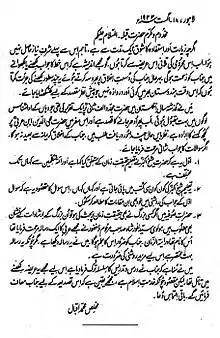Works of Muhammad Iqbal
Sir Muhammad Iqbal also known as Allama Iqbal (1877–1938), was a Muslim philosopher, poet and politician of early 20th-century. He is particularly known in the Indian sub-continent for his Urdu philosophical poetry on Islam and the need for the cultural and intellectual reconstruction of the Islamic community. He is also considered the "spiritual father of Pakistan" for inspiring the Pakistan Movement in British India. Iqbal became prominence since 1899, when he recited Nalay e Yatem at the annual meeting of Anjuman-e-Himayat-e-Islam, Lahore. The poems he wrote up to 1905, imbibe patriotism that includes the Tarana-e-Hind (popularly known as Saare Jahan Se Achcha). The Bang-e-Dara (1924) is a collection of Urdu poetry written in three distinct phases of Iqbals life, In his early work he also wrote on most of the Indian iconic personalities such as Rama Tirtha, Guru Nanak and Rama.[1][2]

Style
First phase
The Urdu poetry Iqbal wrote earlier to his visit of Europe in 1905, is considered by critics as the first phase of his poetry that reflects the blend of Persian mysticism and Patriotism.[1][2]
Work

Urdu
Iqbal's Urdu poetry collection is available in four books.[3]
| Book | Published |
|---|---|
| Bang-i-Dara | 1924 |
| Bal-e-Jibril | 1935 |
| Zarb-i-Kalim | 1936 |
| Armaghan-e-Hijaz | 1938 |
Persian
- Asrar-i-Khudi (1915)
- Rumuz-i-Bekhudi (1917)
- Payam-i-Mashriq (1923)
- Zabur-i-Ajam (1927)
- Javid Nama (1932)
- Pas Cheh Bayed Kard ai Aqwam-e-Sharq (1936)
- Armughan-e-Hijaz (1938) (in Persian and Urdu)
Patriotic poetry
- Himalaya
- Naya Shivala
- Tarana-e-Milli
- Tarana-e-Hind
References
- Faiz (2009). A Treasury Of Urdu Poetry. Rajpal and sons. pp. 94–95. ISBN 978-81-7028-691-2. Retrieved 6 June 2012.
- Sisir Kumar Das (2005). A History of Indian Literature: Western impact:Indian response, 1800–1910. Sahitya Akademi. p. 326. ISBN 81-7201-006-0. Retrieved 6 June 2012.
- K.C.Kanda (2009). Masterpieces of Patriotic Urdu Poetry: Text, Translation, and Transliteration. Sterling Publishers private limited. p. 121. ISBN 978-81-207-2893-6. Retrieved 6 June 2012.
Further reading
- S.M.H.Burney (1987). Iqbal: Poet-Patriot of India. India: Vikas Publication. ISBN 0-7069328-9-7.
- Schimmel, Annemarie (1989). Gabriel’s Wing: Study Into the Religious Ideas of Sir Muhammad Iqbal. Pakistan: Iqbal Academy. ISBN 978-9694160122.